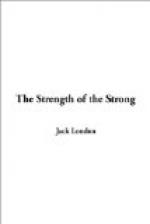“It must ‘a’ been a big un,” the pilot remarked sympathetically.
“Aye, ut was thot. Thungs was lively for a but. Ut finished the mate. He was on the brudge wuth me, an’ I told hum tull take a look tull the wedges o’ number one hatch. She was takin’ watter freely an’ I was no sure o’ number one. I dudna like the look o’ ut, an’ I was fuggerin’ maybe tull heave to tull the marn, when she took ut over abaft the brudge. My word, she was a bug one. We got a but of ut ourselves on the brudge. I dudna miss the mate ot the first, what o’ routin’ out Chips an’ bulkheadun’ thot door an’ stretchun’ the tarpaulin over the sky-light. Then he was nowhere to be found. The men ot the wheel said as he seen hum goin’ down the lodder just afore she hut us. We looked for’ard, we looked tull hus room, aye looked tull the engine-room, an’ we looked along aft on the lower deck, and there he was, on both sides the cover to the steam-pipe runnun’ tull the after-wunches.”
The pilot ejaculated an oath of amazement and horror.
“Aye,” the skipper went on wearily, “an’ on both sides the steam-pipe uz well. I tell ye he was in two pieces, splut clean uz a herrin’. The sea must a-caught hum on the upper brudge deck, carried hum clean across the fiddley, an’ banged hum head-on tull the pipe cover. It sheered through hum like so much butter, down atween the eyes, an’ along the middle of hum, so that one leg an’ arm was fast tull the one piece of hum, an’ one leg an’ arm fast tull the other piece of hum. I tull ye ut was fair grewsome. We putt hum together an’ rolled hum in canvas uz we pulled hum out.”
The pilot swore again.
“Oh, ut wasna onythun’ tull greet about,” Captain MacElrath assured him. “’Twas a guid ruddance. He was no a sailor, thot mate-fellow. He was only fut for a pugsty, an’ a dom puir apology for thot same.”
It is said that there are three kinds of Irish—Catholic, Protestant, and North-of-Ireland—and that the North-of-Ireland Irishman is a transplanted Scotchman. Captain MacElrath was a North-of-Ireland man, and, talking for much of the world like a Scotchman, nothing aroused his ire quicker than being mistaken for a Scotchman. Irish he stoutly was, and Irish he stoutly abided, though it was with a faint lip-lift of scorn that he mentioned mere South-of-Ireland men, or even Orange-men. Himself he was Presbyterian, while in his own community five men were all that ever mustered at a meeting in the Orange Men’s Hall. His community was the Island McGill, where seven thousand of his kind lived in such amity and sobriety that in the whole island there was but one policeman and never a public-house at all.




